Hello everyone. Happy Monday. I’m really excited for the week! Lots of cool stories to work on and to share from our writer Lisa Caballero, family biking columnist Shannon Johnson, and a special guest contributor Aaron Kuehn of BikeLoud PDX.
This week’s Monday Roundup is sponsored by The E-Bike Store, your source for excellent electric bikes. Come visit their north Portland showroom right across the street from Peninsula Park.

Here are the most notable news items our community came across in the past seven days…
Bike share price cap: I like any policy that treats bike share more like public transit, so it was neat to see this new bill introduce in New York City that would cap the price of a bike share ride to be no higher than the cost of a subway or bus ticket. (Streetsblog NYC)
Dangerous drivers: When drivers slam into a convenience store or building it becomes a meme. But the same epidemic of terrible, irresponsible driving can also lead to much more serious things like this natural gas pipeline fire in Houston that was caused by an errant SUV driver who struck a valve. (NBC)
School drop-off lines: A venerable outlet delves into the reasons behind nightmarish school drop-off lines and makes a solid mention of Portland’s bike bus efforts, including a link to this here website! (The Atlantic)
The Rivendell Way: I have long admired how Grant Petersen runs his bike company, so reading this wonderful, in-depth profile about this guy who has always stood out from the crowd for the right reasons, was a joy. (The New Yorker)
Delivery logistics: I put the role of cargo bikes making last-mile deliveries squarely into the “we don’t talk about this enough” category when it comes to making our city more humane and climate-friendly. (EuroNews)
Toll of tickets: There’s a lot that’s shocking about this article that describes some of the similar issues we’ve faced here in Portland with the Rubio revelations, but what really gets me is how the irresponsible headline contributes to the problem. (Washington Post)
Bike Angels: I don’t hear about anyone Portland doing this with Biketown as much as I used to, but it appears as though the citizen bike share rebalancing hustle is alive and well in New York City. (NY Times)
Canadians and cars: Transportation is very political in Ontario, Canada as Premier Doug Ford seems to be making a bid for votes by saying he’ll make bike lanes harder to build and speed up car-centric road projects. (CBC)
Justice for traffic violence: Imagine a third-party evidence-sharing tool that would allow road users to upload content of illegal behaviors to be reviewed by the authorities for possible enforcement action. That’s what’s in the works in Scotland. (Road.cc)
Thanks to everyone who sent in links this week. The Monday Roundup is a community effort, so please feel free to send us any great stories you come across.



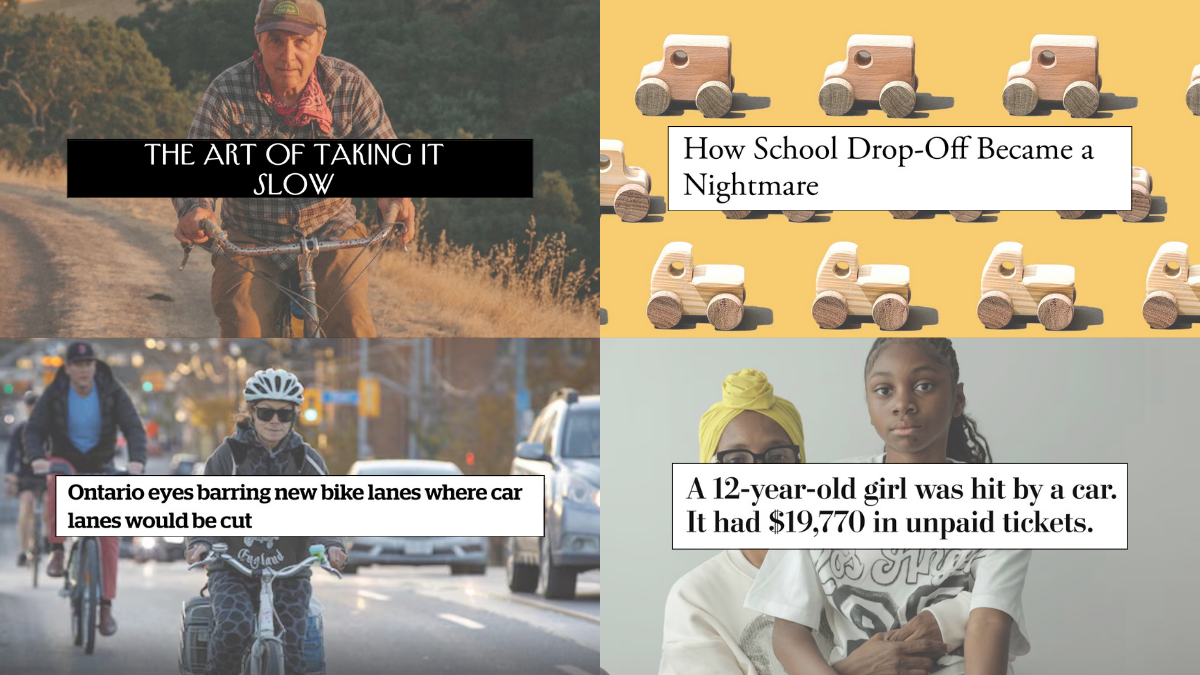
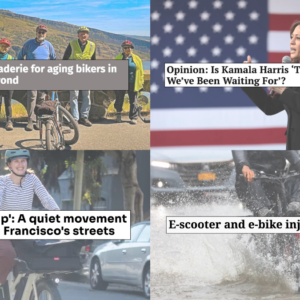
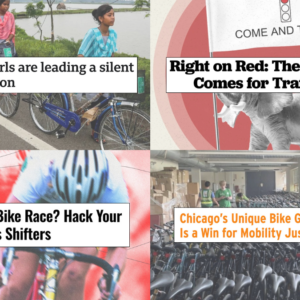
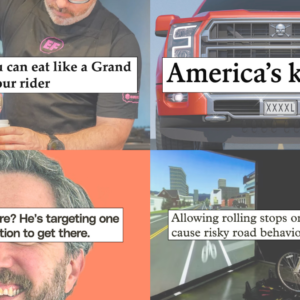
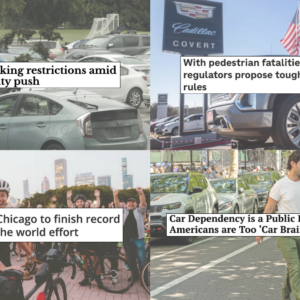
Thanks for reading.
BikePortland has served this community with independent community journalism since 2005. We rely on subscriptions from readers like you to survive. Your financial support is vital in keeping this valuable resource alive and well.
Please subscribe today to strengthen and expand our work.
As the article notes, in many cases, the “hustle” involves completely emptying out hubs and completely filling up others, then reversing the move. Much of this is bad for end users.
Regarding the bike share price cap. The cost of charging and rebalancing bike fleets (which requires significant amounts of human labor) can make bike share rides much much more expensive than transit rides, especially in a place like New York City, where the subway moves millions of people a day, and the marginal costs of an additional passenger are negligible. Capping the price of potentially very expensive bike share rides is a ridiculous and inefficient subsidy. This issue is made worse by people who intentionally exploit the system to make money by moving bikes around to places where they are not needed and then move them back to earn a profit.
https://www.nytimes.com/2024/09/19/nyregion/citi-bike-scam-nyc.html
I love the idea of bike share, but the user fee needs to be reflective of the cost of providing the service. The same goes for Portland, where a significant chunk of the user base is provided free use of the system at the expense and/or detriment of potential paying customers.
For a brief time Portland bike share users could earn a ride credit by moving a randomly parked bike to a station, but that’s long gone. How hard could it be for the app to determine whether a move was beneficial and set the credit accordingly? This would cut out the needless churning, and users will train themselves soon enough.
Even if you can convince users to rebalance your fleet in a cost effective manner that avoids parasitic losses, like those documented in NYC, you still need to charge the bikes. Portland is not moving in the direction of wired charging hubs (though some cities have started doing this).
But does the user fee really need to reflect the cost of providing the service??? Do user fees for car transportation or transit or other modes reflect the full costs? I would argue instead we should set costs that balance the costs of providing the service and that promote community-serving behaviors, like no or low-carbon transportation options that decrease emissions.
There is no guarantee that bike share trips will be low or no carbon! People have to move them around in vans or trucks to charge them or get them to docking stations. Because Lyft, a for profit company that primarily traffics in very high emissions per mile transportation, is the service provider and infrastructure owner, and because they have an opaque business model that obscures the cost of business operations, and because they contact out a lot of the fleet rebalancing to third party contractors that typically travel around in fossil fuel based vehicles, it is impossible to make the argument that bike share is any more or less sustainable than other options.
Public transit is a low or no carbon option, and the emissions per ride go down as use goes up. Bike share may be low carbon under ideal circumstances, but the emissions per ride do not necessarily go down with higher usage rates. Cities should subsidize transit, not for-profit, private e-bike services unless they can demonstrate that the bike share is competitive on a cost, labor, and environmental scale.
Is fossil fuel based, privately owned automobile based transportation subsidized? You bet it is. But that doesn’t mean that Lyft-operated e bikes are a better solution in the absence of metrics that demonstrate they are a less carbon intensive option.
Also, public transit provides reliable, good paying union jobs with benefits. Shared, for profit E bikes are undercutting that service with non union labor and gig workers.
All you say is true. I just want to suggest counter points.
I think an argument can be made that *even if* the bikes are moved around by ICE vehicles, they could be an improvement over individual auto use. Similar to an ICE powered bus. They still reduce auto traffic (hypothetically – I mean if people used them in large numbers), which is dangerous, and even moving them with ICE trucks is possible / likely to emit less than the car trips they hopefully replace.
My only point before was to say that just because the cost needed to move the bikes is more than transit rides, that doesn’t necessarily mean the price shouldn’t be capped. But there may be other reasons, which you outlined well.
But I agree, this may not be a thing we want to subsidize. Especially considering your last point about undercutting public transit and union labor.
Fair point. Fleet rebalancing could be done efficiently. I just don’t think there is any reason to trust that Lyft is doing that in the absence of transparent reporting.
Hopefully that argument would be based in actual facts. It is highly unlikely that every bike trip is replacing a car trip.
That’s not true, at least in Portland. Nearly empty diesel buses or trains are less efficient than private cars (for that fraction that would drive if not for TriMet). This is especially true for EVs.
There are some TriMet routes that really are a good option from a carbon standpoint, but plenty that are not.
I think transit is much less utilized in Portland than it is in NYC. But there are many lines that are well utilized most days and during most operating hours. Regardless, I find it difficult to imagine a world in which a major American city fully abandons fixed service transit lines.
I agree, at least with the currently available set of alternatives. But given ridership levels, it’s clear some TriMet lines are running well in the red from an environmental standpoint, while other lines work much better.
COTW
I agree to an extend, but I think the fee should reflect the cost of the service unless we think it’s valuable enough that we want to subsidize it. If it’s a service that benefits people a great deal and gets people riding bikes (this is a hypothetical), then I would be OK with making it artificially inexpensive.
Most definitely. If the service is actually providing a community service that can be demonstrated to have significant public benefit, then by all means, subsidize it. But if you’re going to do that, it should be a publicly operated service, not an arm of a for profit company that can choose to discontinue service at any time.
Re: school drop-off traffic.
I have lived on a street with a grade school at the end for over 35 years. It has definitely gotten worse. Throw in a few school buses and it’s utter chaos twice a day on the street. The school has no Safe Routes program because there is no safe route. Students are bussed or dropped off. These kids live no further than a mile away at the farthest. Just another failure at PBOT.
The mean-spirited regresso-grouchery (regressive retro-grouchery) of Grant Petersen and his supporters helped delay the wide-spread adoption of widely used technologies (e.g. disc brakes, carbon forks, e-bikes) that make transportation cycling* a more pleasant experience. It’s one thing to prefer a certain type of bike and a different thing altogether to constantly slam those who do not prefer your particular flavor of bike. For example, Petersen derisively referred to disc brakes as “motorcycle parts” and often described e-bikes as mopeds or motorcycles.
A real world example of how Petersen’s ideology has been harmful is that many local “steel is real” bike shops have historically refused to work on bikes with disc brakes, internal cable routing, carbon components, or e-bikes despite their popularity (and some still do).
*not racing bikes but every day transportation bikes
Oh my.
You must be confusing Grant with someone who actually has some kind of influence on multi-million dollar bike manufacturers like Specialized or Trek or Giant.
But “Grant suppressed disc brakes” would be a great bumper sticker.
You’re obviously angry about something. Blaming it on Grant is kinda funny.
Nice straw man.
I think the formerly wide-spread attitude of people who think like Grant Petersen delayed wide-spread adoption of disc brakes.
The guy who put ****ing Bridgestone bikes on the map, has a blog that millions have read, has published widely-read books reviewed in the NYT, is a major foil of the Bike Snob, has created an enormous cult-like fanbase, and is de facto leader of a slow cycling movement has absolutely influenced the bike industry — and, more importantly, has influenced cycling fans who work in or own bike shops.
Grant Petersen has done an awful lot of amazing things that I respect but that does not mean he should get a pass for being a jerk about the bikes that many of us now ride.
I think your perception of Grant’s influence/relevance might be even more exaggerated than his own. Even if it were true that millions of people have read his blog¹, it would also be true that a number of those readers disagree with him.
Folks like Peterson, Jan Heine, etc have dedicated followings, but they’re all pretty small. They sell marked up products with industry-leading margins to sustain themselves, a few employees, and their hobbies. But I’m serious skeptical that their influence outside of the west coast could even be registered.
Remember 650B tires for randonneuring? No one doing brevets in Europe uses them.
¹ Peterson’s blog entries don’t list page count, so I’m very curious how you arrived at “millions” reading his blog.
“I think the formerly wide-spread attitude of people who think like Grant Petersen delayed wide-spread adoption of disc brakes.”
Based on what? It sounds like you’re saying that the bike industry had disc brake technology all ready to roll out and save the cycling world, but that damn Grant Petersen and his Luddite acolytes we’re blocking it from getting to the masses. If anything, the opposite was, and is, true. It’s why bicycle companies have marketing departments – bikes are (or have been) pretty simple machines that can do their job efficiently for years. But annual growth and meeting payroll demands the Latest Greatest, and that’s been Grant’s main complaint – new for the sake of new, instead of better., along with intentionally making obsolete perfectly good bike technology in order to force adoption and purchase of the new.
That said, I have bikes with disc brakes. I love disc brakes. I have a couple Rivendells, and other bikes with rim brakes. I love rim brakes. Bikes are awesome. Being able to stop is awesome. Grant doesn’t like disc brakes and he’s got his reasons and Rivendell is his company and he gets to do that. But I also know from numerous direct communications with Grant and Will, that if a potential customer contacts them and wants a bike with disc brakes, they will gladly, without any hesitation, direct them to Black Mountain Cycles (Bay area business) or Surly (they love Surly) or Velo Orange, or Crust, or Soma (also Bay area.) They are all about community over competition.
“The guy who put ****ing Bridgestone bikes on the map”
Some would say The guy who took Bridgestone off the map. Bridgestone’s US demise was mostly due to the devaluing of the Japanese Yen, but Bridgestone was also known to zig when everyone else zagged, and it hurt sales. 92 XO-1 with mustache bars? MB-1 with drop bars? Curvy upright alt bars when everyone else was going low and straight? Continuing to spec thumb shifters when everyone else was using integrated brake/trigger pods…There’s still folks in Portland who worked at Bike Gallery in the early 90s who can tell you stories about how hard it was to move Bridgestones in 93-94, and how deep they had to discount them to sell them. I’m pretty sure that for the 10 years of Grant’s supervision, Bridgestone mountain bikes were outsold by Trek, Specialized, Diamondback, and probably Fisher.
“is a major foil of the Bike Snob“
Grant and Eben (Bike Snob) are friends. Eben owns and loves Rivendells. I’ve never heard or read a negative comment from Grant about Bike Snob, and anything Eben says about Grant is satire and everyone is in on it. Google Bike Snob’s post from April 11 this year titled “Deflecting.” It’s got Grant and disc brakes and the F word and it’s funny. But Bike Snob is a columnist for BuyCycling magazine and he knows who writes the checks and where the money ultimately comes from, so he’s not going to piss in the pool either.
“created an enormous cult-like fanbase, and is de facto leader of a slow cycling movement has absolutely influenced the bike industry — and, more importantly, has influenced cycling fans who work in or own bike shops.“
Ah yes, the evil Cult of Rivendell, waging guerilla warfare against disc brakes, carbon forks, electronic shifting – obviously with great success.
“Grant Petersen has done an awful lot of amazing things that I respect”
Name one
And there are other examples where Eben makes fun of Petersen (e.g. a foil).
Fewer than 4,000 people read my Blahg. I make a point to acknowledge that eBikes are super useful and do for many people what bicycles can’t. I believe this and I’m careful to say it. I don’t feeel mean-spirited when I say it, but if that’s your characterization, so be it. I have called disc brakes and motors (electric or otherwise) “motorcycle parts,” but I do that more descriptivesly than derisively. (I don’t ride a motorcycle, but I am a fan of them, and I recognize their contribution-to-harm potential ratio as a positive.) I don’t have control over bike shops, but I suspect that any shop that doesn’t work on certain parts does so no out of some kind of hate or statement-making, but because they don’t fee comfortable working on them. I can’t speak for them, of course, but this is my guess. My own business is not as big as 90 percent of those who know about it think it is, and our mission, if that’s what it is, is to keep certain materials and technologies alive and relevant in times that are decidedly technological, There are others doing the same. Although some may wish we’d retreat to our hovels and keep our heads down, for the sake of diversity alone, it behooves us to speak up, Because there are many cyclists out there who feel a bit disenfranchised or unenthused about the trends and technologies that threaten to take over completely. If we don’t say anything, the risk increases. In 30 years of business, I have not once singled out and personally criticized any small business or competitor. I am guilty of “punching up” at some huge companies, but I acknowledge, also, that they employ a lot of good people, far more than we do. In any case, I am sorry for hurting any feelings. I think or at least hope that those who are more familiar with Rivendell will see some of the good parts. I can understand how it might seem that somebody with strong opinions has “thick skin,”—or maybe should have it (or should shut up). I’m not there yet, and I’m not sure I want to be. I do accept that some people will respond strongly negatively to some things. I don’t think anybody is wrong or bad for riding whatever.
I think your Blahg is far more influential than the number of direct subscribers. For example, I have read your blahg on many occasions (at first as a result of Lovely Bicycle) and then later in response to other cycling news.
I maintain that a lack of comfort with working on very commonly used bicycle part was, IMO, partially due to the skepticism of multiple well-known people in the bicycling industry. For example, Jan Heine has also helped provoke distrust of disc brakes on multiple occasions in his missives.
Thank you for this.
As I mentioned above, I admire your contributions to the cycling industry and the cycling community but “strong opinions” about the basic utility of the bikes that many people ride are an invitation for strong responses. I also apologize for my somewhat exaggerated criticism.
Bro he gave you the number and you still try to argue he’s bigger. Grant does grant, no one expects any more or any less. That has been the inside industry view of him for decades.
On “Toll of Tickets”
It’ll be really interesting to see what happens here, and what lessons can be learned for creating and revising laws related to traffic cameras. I’ve wondered about using evidence from paid or unpaid violations from traffic cameras being used to establish a pattern of behavior when charging reckless drivers. The driver’s story and painting himself as the victim is appalling. I hope that the tickets help see through the BS and make sure justice is served.
How long until the family of the SUV driver sues Energy Transfer because they didn’t install bollards around the valve? After all, this has happened before.